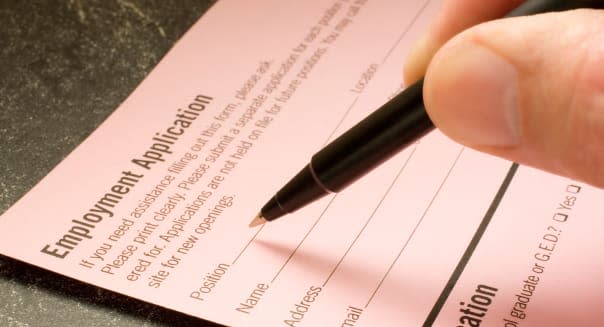Workers' Rights Groups: It's Time to Outlaw Job Applicant Credit Checks

Have you ever applied for a job, only to be told that before the company will consider hiring you, you'll need to consent to a credit check?
So far, only a minority of workers have to submit to this indignity. But according to worker advocacy group The Leadership Conference on Civil and Human Rights, it's a growing trend: 47 percent of employers in the U.S. now require that new hires submit to credit checks when applying for certain positions.
The Leadership Conference is not especially pleased about that. And they intend to do something about it.
On Tuesday, a coalition of 50 advocacy organizations, including the American Association of People with Disabilities, Demos, NAACP, Lawyers' Committee for Civil Rights Under Law, and Service Employees International Union sent a letter to members of the Senate, urging them to co-sponsor a bill that Sen. Elizabeth Warren (D-Mass.) has put forward.
Titled the Equal Employment for All Act, this proposed law would forbid requiring credit checks as a condition of hiring or promoting applicants for "most" positions.
As the letter's signers argue: "In addition to the weak economy, job-seekers today confront another less discussed challenge -- employers that require credit checks as a condition of employment. Not only does this practice discriminate against the long-term unemployed, it has a disparate impact on communities of color and people with disabilities and constitutes an unwarranted invasion into job seekers' personal lives."
A Bigger Problem Than You Realize
How big of an impact does it have? Advocacy group Demos says that "1 in 4 unemployed people from low- and middle-income households with credit card debt" have been asked to submit to a credit check when applying for work.
With 13 million Americans having been thrown out of work by the Great Recession, more and more Americans belong to this category today. And because these applicants are now not in the greatest of situations, financially speaking, Demos reports that "1 in 7 jobseekers with poor credit say they had been told they would not be hired for a position because of their credit history."
American Dreams and Rude Awakenings
The activists point out that this seems like an especially unfair Catch 22, inasmuch as by keeping these applicants out of jobs for which they're otherwise qualified, the practice of credit checking denies them the ability to earn the income to keep up with their bills -- the very thing that would help them pass a credit check in the first place.
%VIRTUAL-article-sponsoredlinks%Indeed, the practice may be more than unfair. It may already be illegal.
The activists cite a 2007 report by the Federal Reserve Board that found that, for example, "African Americans and Hispanics had considerably lower credit scores than non-Hispanic whites." That smacks of discrimination on its face, and if employers are making hiring and promotion decisions in part based of these lower credit scores, they risk compounding the discrimination.
An Inappropriate Tool
Of course, employers argue that it is never their intention to discriminate. The rationale most often cited to justify checking the credit of new hires, and new promotions, is preventing on-the-job fraud. The worry, say the practice's defenders, is that "employees who are behind on their bills will be more likely to embezzle funds or engage in other criminal activity."
Yet according to the activists, time and again, studies that have attempted to verify this hypothesis have instead refuted it, "fail[ing] to find a link between low credit scores and propensity to commit financial crime at work." In particular, activists cite a 2010 statement by Eric Rosenberg, Director of State Government Relations for credit ratings organization TransUnion, who testified before the Oregon state legislature: "At this point, we don't have any research to show any statistical correlation between what's in somebody's credit report and their job performance or their likelihood to commit fraud."
So as it turns out, running credit checks on employees isn't even helping the employers. One thing's for certain: It's definitely not making job-seekers happy.
Motley Fool contributor Rich Smith has pretty good credit. Yet he's never yet heard an interviewer exclaim: "Hey! What a great credit report! You're hired!"

